
by Steve | Mar 18, 2021 | Magazine, Magazine Articles, March/April 2021
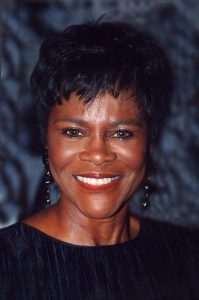
Cicely Tyson, 1997. Photo: © John Mathew Smith.
By Steve Beard —
“We don’t have long here, children. Our hopes and aspirations may feel limitless, but our days are finite, our experiences fading in the twinkling of an eye,” observed actress Cicely Tyson in her recent memoir, Just As I Am.
“Death is a love note to the living, to regard every day, every breath, as sacred. ‘What is your life?’ the scriptures ask us. ‘You are a mist that appears for a little while and then vanishes’ (James 4:14). The Spirit is ever beckoning us to heed that wisdom,” Tyson continued, “to get on with what we’ve been put here to do.”
Her autobiography was published one week before she died on January 28. She was 96.
Having stepped into more than 100 different acting roles over her illustrious career, Tyson was as mystically discerning about the characters she would portray as she was confident that God was authoring her “Grand Story Line,” as she called it. “I am a firm believer in divine guidance. Above all, I am God’s child, cradled in his unfailing arms, guided by his infinite wisdom,” she wrote. “Everything that is happening in my life is unfolding exactly as God has intended. There are no coincidences. Rather, there is a loving Savior who holds my future as securely as he does my life, and at every juncture, he is whispering his will, showing me the way.”
Don’t be mistaken into believing that a life with navigation from above is necessarily an easy one. Her story testifies to that. Although she was a celebrated model, actress, and activist, she suffered crass indignities and discrimination as a Black woman. Although her pioneering roles presented her with a public platform, she was simultaneously on the receiving end of the brutality of bigotry.
“To ever heal these deep racial traumas – and seldom has it felt more urgent that we do – we must acknowledge that they indeed still exist, throbbing and tender beneath the surface, spilling over, like molten rage, into the streets,” she wrote. “Turning a blind eye to our history has not saved us from its consequences.”
Through it all, Tyson’s persistent excellence at her craft helped her capture three Emmy Awards, a Tony, and an honorary Oscar. She appeared in more than 25 films, 60 television shows, and 15 Broadway productions. She was honored by the Kennedy Center and awarded the Presidential Medal of Freedom.
Tyson believed that the arts could truly be a force for good and expand the civil rights vision. “My art had to both mirror the times and propel them forward,” she wrote. After the assassination of Dr. Martin Luther King Jr., Tyson was the co-founder of the Dance Theater of Harlem. In 1995, a magnet school in East Orange, New Jersey, was renamed the Cicely Tyson School of Performing and Fine Arts.
“I couldn’t have dreamed up a script more compelling than the one that played out for me,” Tyson wrote. “Who just happens to be approached on the street by a total stranger, only to have that man propose modeling, only to have that modeling work become a footbridge to the stage? To some, this might look like happenstance, a sequence of coincidences, a string of disconnected flukes. As I see it, my tide shift, my sharp turnaround, had the Savior’s handprints all over it. His sovereignty was apparent to me. It still is. The same Master who holds the firmaments in the crease of his palms, who commands oceans to recede, who maintains humanity’s entire existence with the mist of his breath – that God, the Source of time itself, the Creator of all life, has forever been directing mine.”
Just As I Am is not a conventional Christian bookstore devotional. That is not its intent. The confident testimony that appears is from one who grimaced through the broken marriage of her parents, her own unwed pregnancy, and her tumultuous romantic relationship with jazz legend Miles Davis. Through shipwrecks and sunrises, she consistently testified to the faithfulness of God.
At twelve, she began playing songs from the church hymnal on the piano. “During long afternoons as the sun’s mango rays painted shadows on our walls, I’d sit hunched over those chipped keys, soothing myself with the message of the hymn that has become my daily meditation: ‘Just as I am, without one plea/ But that Thy blood was shed for me/ And that Thou bid’st me come to Thee/ O Lamb of God, I come! I come.’”
Strong roles. As an actress, Tyson was outspoken about refusing to take parts that demeaned Black people – even if it meant going without work. The roles she did chose, however, accentuated her brilliance. In 1972, she portrayed Rebecca, the wife of a Louisiana sharecropper in Sounder. Tyson won an Emmy for her portrayal in “The Autobiography of Miss Jane Pittman,” culminating in an unforgettable scene when she sips from a whites-only drinking fountain. Over the years, she played Harriet Tubman, Coretta Scott King, and Castalia in the mini-series “Oldest Living Confederate Widow Tells All.”
In 1977, she became part of television history by playing Kunta Kinte’s mother in the TV series based on Alex Haley’s “Roots.” Airing over eight consecutive nights at the end of January 1977, the series blew apart the Nielsen ratings. At that time, the final episode became the most-watched TV production with 51.1 percent of all American homes tuning in for the epic story.
Fast forward through her seven-decade career and, at the age of 88, Tyson became the oldest person to win a Tony award in 2013 for her role as Mrs. Carrie Watts in the Broadway revival of Horton Foote’s “The Trip to Bountiful.” One notable part of Tyson’s performance triggered a newsworthy Broadway reaction when the audience joined Tyson in singing the classic hymn “Blessed Assurance” during the second act.
“From the first note, there’s a palpable stirring among many of the black patrons in the audience, which the play, with its mostly black cast, draws in large numbers,” reported The New York Times. “When Ms. Tyson jumps to her feet, spreads her arms and picks up the volume, they start singing along. On some nights it’s a muted accompaniment. On other nights, and especially at Sunday matinees, it’s a full-throated chorus that rocks the theater.”
The gospel song was a special touchpoint for Tyson. She dedicated a third-row pew at Abyssinian Baptist Church in Harlem, her home congregation, to her mother’s memory. The plaque reads, “To mother – Blessed Assurance,” a reference to the beloved hymn.
“On Sundays when I take my seat near her name, I think of all she endured, the many times she surely wanted to give up but pressed onward,” Tyson writes in her book. “I recall her swaying, eyes tightly shut, as the words of that hymn washed through her. ‘This is my story, this is my song,’ she’d belt out during the refrain. ‘Praising my Savior, all the day long.’ Her powerful testimony, grounded in grace and nourished in glory, has since become my own.”
At the age of 93, she gave a message to her home congregation about her religious upbringing. “We were in church from Sunday morning to Saturday night,” she said to laughter in the sanctuary. She played the organ, taught Sunday school, led the choir, and cleaned the church. “I decided at one point that if I ever lived to become a woman, I would never enter the portals of a church again,” she said jokingly – once again, to sustained laughter.
However, the magnetism and solace of faith proved to be almost irresistible. “I look daily toward heaven for restoration, for spiritual healing,” she wrote in her book. “My true identity isn’t rooted in our history, grievous and glorious as it is. It is grounded in my designation as a child of God, the daughter of the Great Physician. In his care, I find my cure.”
Rest in peace, Sister Cicely. Rest in peace.
Steve Beard is the editor of Good News.

by Steve | Mar 18, 2021 | Magazine, Magazine Articles, March/April 2021

Photo from iStock.
By Carolyn Moore-
Thinking back only two years ago, it is hard to imagine that wearing a medical mask could have become a national political conflict. And if someone had told me only a year ago that my faith would be called into question because I suspended in-person worship for three months during a worldwide pandemic, I would have smirked at such Orwellian nonsense and suggested a twelve-step group.
And yet, here we are. These are strange days indeed, as this crisis has frayed the national fabric and exposed the depth of our political and spiritual divide. But as with most things, there is an opportunity here to bring beauty from ashes. In a country fighting – literally fighting – for its life, Christians have a choice to make about our allegiance. Who is our King? Where is our country? What defines our worldview?
We are not the first to need such redefinition. In the New Testament, Peter’s letter to the Christian communities scattered across Asia Minor (a region that would fall inside Turkey’s boundaries today), was written to folks enduring deep and worsening tribulation. Peter’s letters were meant to encourage and inspire them to see themselves not as pawns of the state but as citizens of an alternate Kingdom. Although the world – and in particular the Roman Empire, the dominant earthly power in their world – did not value or want them, God did. And not only that, but God could offer them a country of their own, a worldview that would endure beyond an empire, and a King who loved them, chose them, and had plans for them.
In an age when the emperor was often considered to be a kind of god and a force to be feared, and allegiance was expected without question, Peter’s message was radical. Yet, into that very culture Peter would boldly speak the language of choice and rejection, priming his audience to hear that a choice to follow one empire was a choice to reject another, and that in fact they had already been chosen by one who had already been rejected by the very world that was now rejecting them.
In his letter, Peter would quote Psalm 118:22: “The stone the builders rejected has become the cornerstone” (1 Peter 2:7). Jesus would wield the same verse as a warning to the Pharisees: by rejecting Jesus, they were rejecting the Kingdom of God (Matthew 21:42). Peter would proclaim that this One, though rejected, has become the reigning King. Those who follow him would become citizens of his Kingdom and his gospel would become their worldview.
A citizen of this Kingdom would be known not by party affiliation but by supernatural transformation: “You are a chosen people, a royal priesthood, a holy nation, God’s special possession, that you may declare the praises of him who called you out of darkness into his wonderful light. Once you were not a people, but now you are the people of God; once you had not received mercy, but now you have received mercy” (1 Peter 2:9-10).
Every word in this passage deserves its own exegesis, but for our purposes we will focus on what it means to be chosen as a special possession. Our Wesleyan ears should hear again that chosenness is our theological inheritance, too. It is the gift of a life that has been fundamentally altered to reflect an other-worldly character, resulting in an other-worldly allegiance – in the world but not of it. And it is the leaven that works its way through a culture to fundamentally transform it into God’s special possession as well.
Chosen. A naturally competitive world teaches us to eye each other with suspicion and vie for our place. That spirit creates panic-runs on the grocery store and causes us to pull in and care only for “us and ours.” Chosenness is a critical quality of a Kingdom citizen. It was the missing piece in John Wesley’s spiritual life that – once discovered – changed the trajectory of his ministry and sparked a global revival.
Augustus Spangenberg once asked John Wesley if he knew Christ, only to have Wesley respond academically, “I know He is the Savior of the world.” Spangenberg pressed him on that point. “But do you know yourself?” That question exposed an interior world of self-doubt that plagued Wesley’s spiritual life and ministry effectiveness. 
The conversation with Spangenberg laid the groundwork for a later encounter with the Holy Spirit, after which Wesley could finally embrace the truth of his own personal chosenness. “I felt that I did trust in Christ and Christ alone, and an assurance was given me that He had taken away my sins, even mine …” (emphasis added).
Knowing ourselves as chosen not only allows us to conquer feelings of fear and spiritual inadequacy, but fundamentally shifts how we engage the world around us. We can operate from a secure place, our identity rooted in a firmer foundation than the shifting sands of partisan politics. When we know ourselves as chosen, we can empathize with the pain of others without feeling ourselves diminished in the process.
Jesus’s word to his followers that they were like a city on a hill or a lamp on a stand is a good word for us who worry that we are not enough. When a lamp gives off light, it isn’t diminished by that. Unless it burns out, it keeps giving light at the speed of light, even if everything around it is darkness. When we know ourselves as chosen and not in some way depleted, we can love, share, serve, and listen to understand, and yet be undiminished by all we give. We only increase the circle of illumination around us.
Royal. Peter goes so far as to qualify our chosenness as royal. We are children of the King. In a brutal, competitive, me-first world, Kingship is often acquired or defended by taking the lives – shedding the blood – of challengers. Meanwhile, Jesus is the anti-king-of-the-hill king. Rather than a tyrannical monarch who kills to gain power, King Jesus gave his blood away. When we allow his royal blood to course through our veins, we become members of his household with all the rights and privileges afforded to royalty. When we know ourselves as royal, we begin to see our needs as covered by virtue of our place in the royal family.
By calling Jesus’ followers “royal,” Peter shapes a new definition for citizenship. “Once you had no identity as a people; now you are the people of God. Once you had not received mercy but now you have received God’s mercy” (1 Peter 2:10). As children of the King, we have inherited all the rights and privileges of a royal family. In biblical terms, we are holy; and yet, we are not called to hold ourselves out from the world but to invite others into the Kingdom of God.
“Your task is to find the symbolic ways of doing things differently, planting flags in a hostile soil, setting up signposts that say there is a different way to be human,” writes British biblical scholar N.T. Wright. “And when people are puzzled at what you’re doing, find ways – fresh ways – of telling the story of the return of the human race from its exile, and use stories as your explanation.”
As royalty, we have the right, responsibility, and pleasure of inviting the world out of exile, introducing it to its alternate story of an in-breaking Kingdom that will never end.
God’s own possession. The Greek word Peter uses for “special possession” – peripoiesis – is fire-breathing. We find this word used five times in the New Testament and with various nuances of meaning. It can mean “a purchased possession,” but it is also used to talk about obtaining salvation. Where we see it used in that way, it is as if God is obtaining salvation for us, rather than us obtaining it for ourselves.
This word teaches us something about how God comes for us. He comes to buy us back, to provide a kind of protection, to get us out of bondage. And yet, peripoiesis is even more than that. Peri means “around.” Possession in this sense is literally God drawing a circle around us, as if to say, “This one is mine.” The word radiates the truth of our chosenness, of our regal status.
God has come for us, has drawn a circle around us, has claimed the ground around us as Kingdom soil and us as Kingdom citizens. There seems to be muscle behind this word, a sense not only of coming after us but of snatching us out of the hands of our enemies. Peripoiesis is the Great Lion of Judah hearing our cries and knowing our trouble and coming to stand guard over us until the enemy has passed by. Surely this is the spirit of Paul’s words to the Corinthians. “You are not your own, for you were bought with a price” (1 Corinthians 6:19-20).
Inside that word – peripoiesis – is the word poiesis. In philosophy, poiesis is “the activity in which a person brings something into being that did not exist before,” observes theologian John Polkinghorne. Or as Peter would say in this same verse, God has called us out of darkness into his marvelous light (1 Peter 2:9). When God, who creates new things out of nothing, possesses us and draws us into Kingdom citizenship, he introduces something new into the world, almost as if uncovering a treasure buried in a field.
“Christians are the insiders who have diverted from their culture by being born again,” writes theologian Miroslav Volf. “They are by definition those who are not what they used to be, those who do not live like they used to live. Christian difference is therefore not an insertion of something new into the old from outside, but a bursting out of the new precisely within the proper space of the old.”
And why does God so transform us in this way? So we can declare his praises. As citizens of the Kingdom of God, our work is to declare the praises of our King and to reject anything other than the Kingdom of God as our highest priority and only allegiance. It is not ours to determine whether one party or another (or even one country or another) is more or less holy. The unshakable Kingdom of God is our country, and we are Kingdom people – royalty with power to inform and transform the community and world in which we live, vote, speak, act, and have our being.
King Jesus is our leader, a just and holy God who demands and deserves our absolute allegiance through faith and works. His gospel is our worldview and platform; it informs our every choice. Let that guide our every public comment and private musing as we navigate a volatile culture in desperate need of transformation.
Carolyn Moore is lead pastor of Mosaic United Methodist Church in Evans, Georgia. In addition to being a sought after speaker, blogger (artofholiness.com), author of several books, including Supernatural: Experiencing the Power of God’s Kingdom (Seedbed), Dr. Moore also serves as the chair of The Wesleyan Covenant Association’s Global Council. This essay first appeared at Firebrand (firebrandmag.com) and is reprinted here by permission.

by Steve | Mar 18, 2021 | Magazine, Magazine Articles, March/April 2021
 By Zim Flores –
By Zim Flores –
The book of Jonah chronicles a man of the same name who rebelled against the instructions of God and fled from Nineveh. He was tossed into a tumultuous sea, only to be swallowed by a giant fish that God had appointed. Inside the fish’s belly, Jonah was faced with a decision: he could either force his way out of the fish – gutting it from the inside out – or he could embrace the stillness.
The situation couldn’t have been comfortable for Jonah. It was probably terrifying. He probably felt stranded, trapped on all sides even. But as he prayed to God, he didn’t pray for deliverance, like many would have.
It was only while being still, inside the fish, that he received revelation. There he was, trapped in the belly of this creature for three days and three nights. Instead of trying to escape, he made a declaration. He acknowledged his own shortcomings and thanked God, offering up a sacrifice of praise and proclaiming that God had the final say.
In times like these, it’s important that we don’t find ourselves desiring deliverance more than revelation. Sometimes, when we don’t understand what’s happening around us, we just want the pain to stop. But wanting out too early simply evades the process that God wants us to go through. It eliminates the growth we’ll experience if we stay the course.
There are countless examples of men and women of God being put to the test. But what is most noble and notable about their stories isn’t of their escape; it’s what happened when they endured.
As much as we desire the rescue, we have to find comfort in the discord. Refusing to gut the fish means that we’re committed to the assignment God has for us.
When Jonah was delivered from the belly of the fish, he wasn’t regurgitated into the ocean to fend for himself. He didn’t have to swim miles back to shore. Even though he was tossed into the ocean in the middle of a storm, Jonah was delivered onto the safety of the shore. Jonah was delivered on firm ground with a fresh revelation of his assignment. “Then the word of the Lord came to Jonah the second time, saying, ‘Arise, go to Nineveh, that great city, and call out against it the message that I tell you’” (Jonah 3:1-2).
The Darkest Hours. Even in our darkest hours, we are still under the protection of the Lord. We will never understand our purpose if we always gut the fish.
Choosing not to gut the fish is perhaps the most grueling part of it all. We know that God sees what’s happening, and sometimes it seems like cruel and unusual punishment. But how else will God grow us?
No matter how painful or how terrified we are of the unknown, we have to remember that our former lives weren’t necessarily better. They were just different. When we find ourselves dwelling on the simpler days, we should remember Isaiah 43:18-19, which says, “Remember not the former things, nor consider the things of old. Behold, I am doing a new thing; now it springs forth, do you not perceive it? I will make a way in the wilderness and rivers in the desert.”
Those who stayed in the midst of their challenges benefitted from a full restoration of God’s promise in their lives.
• Joseph was a dreamer who was sold into slavery, but later became a ruler over Egypt.
• Job had everything taken from him, but never cursed God. In the end, his riches were completely restored – and then some.
• David was a shepherd boy who became the king of lsrael.
• Esther was an orphan who became a queen.
• And Rahab was a prostitute who became an ancestress of Jesus Christ.
God wants to deliver us unto our purpose, but it’s up to us to stay the course.
Within the quiet moments of a tumultuous season, you’ll find the answers you need – as long as you don’t force your way out. Pause and praise. We can’t pray our way out of a silent season. But we can pray for the strength to endure and for an open heart to receive. That’s how we make it out to the glory of God.
God is a character-forming God. He turns our times of transition into testimonies for His glory.
The word selah is mentioned roughly seventy-four times in the Bible. Although its exact meaning is unknown, many scholars agree that its meaning necessitates two things: a pause and a praise. Selah then becomes the conduit by which we learn to appreciate the many transitions of life, whether planned or not. When we think about the goodness of God, we cannot fully do so without pausing to reflect on the many ways that he has shaped our lives and saved us from the devices of the enemy. 
The moment praise dwells on our lips, God is in the midst. The Bible says that God inhabits the praises of his people (Psalm 22:3). Pausing and praising doesn’t just change our hearts, it transforms our minds. When we thank him for the things he’s already done, what he has chosen not to do in our lives begins to fade into the distance.
The reality is that faith in the middle of suffering looks a lot different than faith in the testimony. Faith during our testimony is polished. It speaks of an undeniable, unshakable faith in the goodness of God and his sovereignty. But faith in the middle of our suffering asks questions. It doubts. It can be angry. As we go through new challenges, we realize that faith isn’t pretty. It’s ugly. It’s hard. It can break us. And our lack of it can turn us away from God.
Faith requires a pause. And let’s be honest: no one likes waiting. We wait in long lines. We wait in traffic. We wait for the perfect relationship. We wait months for our babies to arrive. Pausing without praising leaves room for the enemy to introduce tactics of deceit and confusion. An idle mind breeds more contempt.
Think about what we’ll be able to do for God’s Kingdom if we master the art of pausing and praising. Selah means that we are actively positioning ourselves to receive God’s best. It means that we acknowledge God’s direction and timing in our lives. Faith is important. In fact, the Bible says that it is impossible to please God without it (Hebrews 11:6). Imagine your life if during every trial you had absolute confidence that God was with you. Or imagine your response if you knew God was working within the details to leverage everything for your good.
Faith grows from being tested and enduring. We grow from faith to faith; we don’t just magically start with tons of faith in God. According to Romans 12:3, God gives everyone a measure of faith. As Christians, it is then our responsibility to continue to grow in it.

This is not to say that there is always a reward for your pause and your praise. Perhaps it simply means that God will change your heart about that very thing you thought you wanted. When Jesus and the disciples were in a boat that was caught in a big storm, Jesus took a nap while the disciples were beside themselves. They woke him up to ask him to save them. Matthew 8:26 says, “And he said to them, ‘Why are you afraid, O you of little faith?’ Then he rose and rebuked the winds and the sea, and there was a great calm.”
By sleeping through the storm, Jesus was saying that we can trust him even in the middle of it. When we pause without praising, we become hasty. We get impatient. We try to take matters into our own hands to try and help God out. When we choose to stay where God places us, we continue to work as unto the Lord, prioritizing our relationship with him as we serve others.
It may not be our fault that we’re in a given situation. It’s not our responsibility to figure out what got us there. But it is our responsibility to bloom where God plants us if we dare. Everything that we go through is meant for the greater assignment that he has for us: to be more like him. If our life is a staircase and Jesus is on the top step, with every gutted fish, we take a step backward. But God holds us there in his grace. We are already redeemed by his blood. And with every season we stay in the belly of the fish, we take a step toward our purpose.
Zim Flores is the author of Dare to Bloom: Trusting God through Painful Endings and New Beginnings. An entrepreneur, Zim is the founder of Italicist, an online styling service, and is a Forbes “30 Under 30” awardee. (c) Zim Flores. Adapted by permission of Thomas Nelson.

by Steve | Mar 18, 2021 | Magazine, Magazine Articles, March/April 2021

The Ashantika people of northern Peru work hard for basic survival near the Amazon River.
By Joy Smith Griffin –
“Anyone who believes in me may come and drink! For the Scriptures declare, ‘Rivers of living water will flow from his heart.’“ John 7:38, NLT
“This river is our life.”
Unspoken, yet undeniably implied, these words played out before me as I stepped gingerly onto the banks of the Amazon River in northern Peru. Having been deposited on the edge of the tropical rainforest by John, our missionary pilot, my friend Carolyn and I disembarked from the tiny, four-seat floatplane, our backpacks most likely representing more material goods than the sum total of all these precious Ashantika natives.
With some clad in rags and others in altogether nothing, young mothers were washing their little ones in the murky, dark-brown river water, while others were gathering the same in clay jugs for cooking. Young men in primitive dugout canoes were playfully splashing makeshift fishing poles in the muddy waters, angling for some piranha protein for their day’s diet. Careful to respect their privacy, we trudged on through the rainforest to our camp, a thatched roof structure surrounded by a canopy of lush green vegetation.
Reflecting on my own life’s journey that led up to this moment, my thoughts drifted several decades back to Christian camp meetings in my home state of Georgia. Every summer, my hardworking, dairy-farming parents would set aside a week to take my brother and me to a gathering with other believers for some good old-time revival meetings, fellowship around the campfire, singing gospel songs, and just plain fun. Having given my life to Jesus at the age of twelve, I was curious about going deeper in my walk with Him.
The next summer, I seized my opportunity. The missionary guest speaker had just shared a midweek message about all the unreached people groups of the world. “Did you know that there are parts of the world where people have never even heard the name of Jesus, much less been told the Good News? If you are feeling the tug of the Holy Spirit on your heart tonight to go to the unreached people of the world, to the uttermost ends of the earth, I invite you to come forward now.”
Completely unaware of anything except that I was hearing Jesus call me to go forward, I leapt out of my seat and fell before Him on that sawdust-covered floor. “Here I am, Jesus. Send me!” As I prayed to receive this commission, I had a strong visual impression of a jungle rainforest. Somehow, I knew I would see it one day.
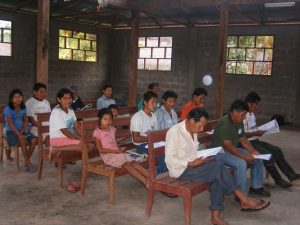
Men and women learn about evangelism at an International Leadership Institute teaching event.
Now in the Amazon jungle, my childhood vision having just become a reality, joy exploded within me as I tearfully offered thanksgiving to God. “Thank you, Jesus, for answering my prayer! Even if you were to send me back home right now, you have fulfilled my dream! With all my heart, I want these people to know you!” Energized by my own elation, knowing that God had sent me and would be with me, I knew I could do anything through the strength Jesus would provide.
When my husband Wes and I launched the International Leadership Institute (ILI) in 1998, we believed it could accelerate the spread of the life-transforming power of the gospel through leaders of leaders empowered by the Holy Spirit. Today, there are more than 300,000 ILI alumni in 108 nations.
Equipped for foreign missionary service through my studies at Asbury Seminary, it was there I had met my friend and present travel companion, Carolyn. As a missionary kid raised in Guyana, she had longed to return to the South American rainforest of her upbringing, so she readily accepted my invitation to go to Peru. While Wes was, and is, completely supportive of my many mission endeavors, he sat this one out. “You go and I’ll pray,” he said.
So here we were! Knowing that our journey would have taken seven days by motor boat from Pukallpa, I expressed my thanks to our pilot, John, and asked him to tell us what had prompted him to become a missionary pilot. Raised in Ecuador, John’s Christian parents had become friends with now-legendary missionaries Nate Saint and Jim Elliot as they were attempting to evangelize the Huaorani Indians, a small, ferocious, unreached people group in the Ecuadorian jungle. Although Nate Saint and Jim Elliot were martyred when the Huaorani attacked and speared them to death, John’s parents were in another location when this tragedy occurred. Hearing the story of these missionaries’ selfless courage, John was determined to follow in their footsteps and went to the States to study aviation, eventually returning to his roots in South America. And now, John was helping us to spread the gospel here in the Amazon jungle.
Having been asked to speak at an evening service which other villages had been invited to attend, I was preparing my heart to listen to what the Lord had for me to share. Noticing some commotion around the compound, I saw a giant rodent the size of a small dog, something called capybaras in the Ashantika language, but which qualified as a rat in my book. Yet the natives were not fending this creature off; they were preparing him to be the main course for their evening meal! As the men dug a deep pit, threw in hot rocks from the fire, added Mr. Rat and smothered everything with banana leaves to keep in the moisture, I realized this would be my supper, too.
But there would be another delicacy on the table. A carb staple in the Ashantika tribe’s diet is yuka, a form of the cassava root, which they dig up with machetes and then relentlessly pound into submission. However, this root is so hard that in order to make it edible, everyone is given a piece to chew on until it softens. And then – oh, Lord have mercy – they spit it back into a common pot for all to enjoy. Our evening meal would be Rat ‘n Root.
Silently thanking God for all the ways he had prepared me for situations like this, I thought gratefully of one of my favorite professors at Asbury, J.T. Seamands, who taught us the importance of cultural relevance in missions. Wes and I, along with the other founders of ILI, included Culturally Relevant Evangelism as one of the eight core values of the Christian faith in ILI training. This basically means when in Rome, do as the Romans do. When in the Amazon jungle, eat rats and roots. And smile. Big. However, I did ask Jesus to help me not vomit as I swallowed it.
 My upbringing on a dairy farm also did away with any squeamishness over sleeping on cow-manure floors, eating maggots and bugs like I did in India, drinking cow’s blood in parts of Africa, you name it. I realized early on that not only my acceptance of native practices, but my participation in them, would build a bridge of trust between us. I would no longer be considered an outsider, but would become like one of them. I knew this was a key to being able to effectively share the gospel.
My upbringing on a dairy farm also did away with any squeamishness over sleeping on cow-manure floors, eating maggots and bugs like I did in India, drinking cow’s blood in parts of Africa, you name it. I realized early on that not only my acceptance of native practices, but my participation in them, would build a bridge of trust between us. I would no longer be considered an outsider, but would become like one of them. I knew this was a key to being able to effectively share the gospel.
With just one precious hour to call my own between our afternoon teaching sessions and the evening feast and service at which I’d be speaking, I decided to take a dugout canoe out on the river and talk to Jesus, since he’s always in the boat. But this one was pretty cramped, since a dugout is just a log with a big hole dug out in the middle where you sit. Grabbing a stick to serve as a paddle, I plopped down into the hole and shoved off from the shore.
“Jesus, the rest of the world doesn’t even know these people are here. But you do, and now I do. They’re unreached because it’s so hard to get to them, so I want this time to matter for eternity. I want them to know you like I know you, Jesus. Tell me what to say to them tonight.”
SPLASH! Suddenly, I heard a major disturbance in the water from the side of the river where I’d just been. Pretty sure it wasn’t the Loch Ness monster, I still had a sense of imminent danger lurking in the muddy brown water, although its opaque darkness provided the perpetrator with a worthy disguise. Knowing I couldn’t turn the dugout around too quickly or I’d capsize, I also knew Jesus was in my boat and would protect me.
“BOA! BOA!” Frenzied shouts from the natives on the river bank accompanied a geyser-like eruption from the water in the place I had just passed over. A giant, stonegray creature was rolling violently behind me – a massive anaconda! This species of snake, a type of boa constrictor, can swallow a human being whole. In fact, anacondas in India are called “cow killers” because they can literally consume a cow in a single gulp. Having seen my shadow, this humongous serpent had surfaced to make me his evening meal, but somehow Jesus kept it at bay as he guided me safely to shore.
Resounding screams erupted from those who had witnessed it from the bank of the river. Having heard stories of friends and relatives who had canoed down the river to trade bananas and never returned, my close encounter with the anaconda overwhelmed them. Not aware that this danger was so present in the river that was life to them, that provided them with water to drink as well as for cooking and bathing, they quickly became aware that I had been protected from harm in a way that could only be described as supernatural. A somber sense of awe settled over the village that night.
With the dawning of the next day came bright sunshine and an excitement in the atmosphere as I prepared to teach. Wanting to share with the students about spiritual warfare from I Peter 5:8, I began to recite that verse knowing my awesome interpreter, Carlos, would be working with me hand in glove.
“Be alert and of sober mind. Your enemy the devil prowls around like a roaring lion … ”
Panic suddenly clouded the countenance of my very competent interpreter. “Carlos, what’s wrong?” I asked in alarm. “There is no word in Ashantika for lion! I can’t describe something that doesn’t even exist for them!”
“Then just say ‘big cat!”‘ I said. “But we don’t have cats either!” he said in exasperation.
Knowing we were between a rock and a hard place, I sent a quick bullet prayer to Jesus. Immediately, the answer came.
“Your enemy the devil is like a BOA! When he sees a shadow come over the water, he tries to drown it!” With that, the Holy Spirit connected all the dots, teaching these people that, while their river may be the source of their physical water supply, only Jesus can save them forever and provide the living water that will never run dry.
News travels fast, even in the jungle, but I was still surprised to see an array of multicolored native headdresses worn by several different tribal chieftains as they floated on boats down the river, coming to a stop at our village.
“We heard that God saved the missionary from the boa! We want to know about this God!” Hallelujah! This opened the door for us to talk about Jesus being the Living Water.
Touched by the truth of God’s Word coupled with this vivid testimony of his ability to rescue us from harm, many prayed to receive Jesus that evening, surrendering their lives to him. Our prayers for the salvation of these people were answered.
Preparing for our departure to the States, we waited for John to return with the floatplane, eager to share these adventures with our pilot friend. However, the look on his face told us we wouldn’t be returning to civilization anytime soon. “I hate to tell you this, but there is a national strike in Peru of all the copper and salt mine workers. All transportation has stopped and there are armed guards everywhere. But knowing you ladies and your call to share the gospel, this might be an opportunity for you to reach another group that has never heard about Jesus. It’s about a 45-minute flight from here; the only thing is, I’m not sure we have enough fuel to get there and back.”
Excited by the possibility, Carolyn and I agreed to go. As we approached the area where John needed to land, he said, “We really need to pray. There may be people, goats, and who knows what else in the water, and then we can’t land. So be prepared to jump out of the plane and I’ll throw your bags out so I can keep the plane moving.”
As we made our debuts as stunt artists, the people on the banks stared at us, two wacko white women wearing skirts and jumping out of an airplane! But the love of Jesus speaks a universal language, and we were able to share the good news with yet another unreached people group.
Our faithful pilot John was not able to make it back to retrieve Carolyn and me, so we had to devise some other way to get ourselves back to Lima. With the strike wreaking havoc throughout Peru, I knew we would have to find a driver who was willing to take some risks. Having reserved $100 in U.S. currency for emergencies, I figured this definitely qualified as one and paid a man to drive us through the cold, dark night through an area known for bandits.
Given the state of these jungle roads, if you can even call them that, it was not surprising when our vehicle broke an axle and came to an abrupt halt. Helping our driver hoist it onto a rock for a makeshift repair, he was able to at least get the car to move again, albeit at the pace of a tortoise. Limping along in the pitch-black night, we came across another disabled vehicle, a truck that had gone off the one lane pig-trail of a road and plunged into a ravine. Some questionable-looking men surrounded it and leered at us as we slowly ambled by. Although we had nothing valuable for them to steal, our nervous driver was quickly convinced of the power of prayer.
With daybreak, we crested a hill and caught our first glimpse of Lima! Pressing on towards the airport, we were surprised to not encounter any road blocks or guards, and soon learned that the Peruvian government had lifted strike sanctions earlier that morning. Sleepless, hungry, filthy, and yet somehow altogether elated, we heaved ourselves into our airplane seats and thanked God for seeing us safely on our way home. It was only after takeoff that we learned the strike had just resumed.
Joy Smith Griffin is the co-founder, with her husband Wes, of the International Leadership Institute (ILIteam.org). Having been paralyzed from a sports injury at the age of 22, Joy’s complete confinement for 18-months led to a personal encounter with God that transformed her. She tells the story in Jumping for Joy. This article is reprinted, by permission, from that book.

by Steve | Mar 18, 2021 | Magazine, Magazine Articles, March/April 2021

“If, as the Gnostics claimed, God could not be sullied by coming into contact with creation because he was ‘pure spirit,’ then, from the outset, the incarnation would not have been possible,” writes Dr. Timothy Tennent. Photo: Pexels.com.
By Thomas Lambrecht-
Our church and our culture are divided. Same-sex marriage, gender identity, pornography, abortion, cohabitation, divorce. These and other “culture war” issues pose a challenge to Christians about how to understand and articulate biblical Christian values in a post-Christian society.
The problem is that we are in reactive mode, responding to each of these separate issues individually by saying “no.” Non-Christians constantly hear the “no,” without every hearing the “yes” that underlies it.
In addition, we fail to see how all of these individual issues relate to each other. We therefore end up teaching and preaching a set of value judgments based on Scripture, rather than a coherent theology that sets forth a positive Christian vision for how to live a godly life.
That is the thesis of a new book by Dr. Timothy C. Tennent, president of Asbury Theological Seminary. For the Body: Recovering a Theology of Gender, Sexuality, and the Human Body is an ambitious effort to construct the framework for a comprehensive Christian understanding of the body that can guide our ethical reflection on many controversial and difficult questions.
“The church has failed to understand that these seemingly disparate issues are actually manifestations of a single root problem – namely, our failure to articulate a Christian view of the body,” Tennent writes. “These issues are like fires that keep breaking out in different parts of the culture, and members of the church are like firefighters desperately careening from one spot to another, trying to put out this fire or that fire. But our focus on extinguishing individual fires has prevented us from examining the underlying cause of those fires. The church has been missing the larger foundational issue because we have been framing the issue in smaller ways. The result is that the society perceives the church to be merely against a range of behaviors or actions, but they have no compelling vision of what we are for” (emphasis original).
Drawing on Scripture, the seminal work of Pope John Paul II (Man and Woman He Created Them: A Theology of the Body), the writings of early church fathers, and the current work of evangelical scholars, Tennent compiles a coherent and comprehensive understanding of how Christians ought to make sense of our embodied existence.
Tennent identifies two heresies when it comes to our relationship with our bodies. One is the neo-gnostic view that separates the soul from the body. It privileges the “heart,” feelings, and the spiritual aspect of human existence, while viewing the body as either evil or of no consequence. This “mind over matter” approach says that what I feel about myself is more determinative of my identity than the reality of the body God gave me. The body then becomes a tool I can use to actualize my existence and express who I really am. Thus, gender identity becomes separated from biological sex, and the body can be altered and shaped in whatever way I desire for my own fulfillment.
The other heresy reduces the body to a set of biological categories with no moral significance. I can do whatever I want with my body because it is just a material substance that has no lasting value.
Foundational to Tennent’s understanding is the reminder that God created us as embodied human beings. Created in God’s image, we point to the Trinity as a union of body, soul, and spirit. We recapitulate the incarnation of Christ in the union of the physical and the material in one person.
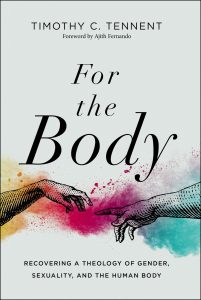 Created Purpose of the Body. Humanity was created for a purpose – to represent God on earth. Fulfilling that purpose, we are given the roles of fruitfulness and stewardship of the earth, including our own bodies (Genesis 1:28, 2:15). We are called “to extend [God’s] dominion over the created world … to steward it according to God’s gracious rule,” Tennent writes. God’s image reflects “a special relational capacity” that is demonstrated in our ability to make covenant relationships with one another, particularly the covenant of marriage. “We understand that we have the capacity to recognize moral categories because we are endowed with the image of God and the empowering presence of the Holy Spirit,” he states.
Created Purpose of the Body. Humanity was created for a purpose – to represent God on earth. Fulfilling that purpose, we are given the roles of fruitfulness and stewardship of the earth, including our own bodies (Genesis 1:28, 2:15). We are called “to extend [God’s] dominion over the created world … to steward it according to God’s gracious rule,” Tennent writes. God’s image reflects “a special relational capacity” that is demonstrated in our ability to make covenant relationships with one another, particularly the covenant of marriage. “We understand that we have the capacity to recognize moral categories because we are endowed with the image of God and the empowering presence of the Holy Spirit,” he states.
Our bodies are not to be idols, either because we exalt the beauty of the body above the beauty of the spirit, or because we replace God’s vision for our bodies with one of our own making. Instead, we are to be image-bearers for God, reflecting his image in the world through dominion/stewardship, relationship, and morally right living.
Creation establishes the moral boundaries within which we are to live. The Fall came about because Adam and Eve resisted God’s created boundaries and wanted to determine their own by eating from the tree of the knowledge of good and evil. God’s image extends to the very physicality of our bodies, in that he created us male and female. Separately, we do not reflect the complete image of God, but together, male and female recapitulate his image in our complementary relationships (Genesis 1:27). The denial of our created gender is a denial of the image of God and of the moral boundaries built into the creation itself.
Icon of Christ. The physical body is an icon, or representation, of Christ’s incarnation. “If, as the Gnostics claimed, God could not be sullied by coming into contact with creation because he was ‘pure spirit,’ then, from the outset, the incarnation would not have been possible,” Tennent writes. “If our bodies are untrustworthy and only serve to mask the true self that is within, then the incarnation of the second person of the Trinity as Jesus of Nazareth cannot be trusted as a reliable means for God’s most profound self-disclosure in history.”
The very physicality of the body is the means by which God wrought redemption through the body of Christ, crucified on the cross and raised from the tomb. Further, our bodies are the channels through which God’s grace comes to us. “We read Scripture with our eyes, we speak it with our mouths, and we hear it with our ears. We take the Lord’s Supper … into our bodies, we pray in and through our minds and bodies,” he observes. “We obey God’s Word and serve others (works of piety) through our bodies. The physical body is the means through which God conveys his grace into our lives, the channel through which God works his purposes in us” (emphasis original).
We are created as embodied spirits in the image of God. But that image has been marred by the Fall. We experience brokenness and disordered desires because of sin. “We should not equate the phrase ‘I was born this way’ with the phrase ‘God made me this way,’” Tennent states. The way we are is not completely the way God intended us to be. Hence, the need for redemption and a “new creation” in Jesus Christ.
Marriage. “Marriage between a man and a woman is an embodied icon pointing to the greater mystery of Christ and his church,” he writes. Marriage is designed to be a covenant that demonstrates the eternal relationship between Christ and his Church. Therefore, marriage is not to be a commodity that has value only as long as the spouse or the marriage are meeting one’s own needs.
Marriage is unitive, uniting two sexually differentiated persons into one, “representing Christ’s unity with his church, the bride of Christ,” Tennent states. “Adultery, fornication, and gay marriage all erode one of the key markers of marriage: the exclusive, unitive sign of our union with Christ as the people of God.”
Marriage is also normally procreative, as demonstrated by the design of the male and female bodies: “When sex is separated from these spiritual realities, fragmentation and brokenness occur.”
Marriage is binary, uniting one man and one woman, “two separate glories – two ‘others’ – coming together in a covenantal relationship,” Tennent writes. Marriage is self-giving, modeling Christ’s sacrificial love. In all these ways, marriage, the uniting of two persons, two bodies, is diminished when the spiritual realities behind it are ignored.
Further, sex outside of marriage “violates the biblical logic of marriage as covenant, since the one-flesh exclusive relationship is meant to be an icon of the faithfulness of God who is always faithful to his covenant with us,” he observes. Marriage is the antidote to consumer relationships, which are valuable only as long as they meet my needs. “If the bond of marriage does not hold up during times of testing and is easily broken,” he believes, “it unintentionally conveys the unreliability of God’s bond with us.”
Singleness. Tennent maintains “singleness and the married life are two intricately related mysteries that anticipate the same future reality,” namely, intimate fellowship with God. Celibate singleness “point[s] back to the dawn of creation, before rebellion and sin entered the world. It serve[s] as a remembrance of our purified state before God in creation prior to the fall,” he writes.
Since marriage is only for this life (Mark 12:25), it “is not an ultimate end, or an end in itself. Rather, it is a temporary reality, one limited to this age, this season of life. A call to singleness and celibacy is a temporal anticipation of a future resurrected life.” By devoting oneself more single-mindedly to matters of the Kingdom of God, the single person can experience more directly the intimate fellowship with God that all will experience in the future age.
Singleness is both a gift and a calling from God. It allows persons “to live in the present age in such a way that they are already embodying the eschatological reality of the marriage supper of the Lamb,” Tennent believes (emphasis original). It has a powerful effect on society. “There is no greater witness against the overly sexualized world of later modernity and postmodernity than a person who embodies the celibate life in anticipation of the age to come,” he writes.
Singleness can also provide an antidote to a too-narrow focus on family and kinship ties. Same-sex friendship is a key component of the single life. Proper sexual boundaries allow “for the healthy growth and flourishing of other kinds of social relationships, and these relationships are diminished when sexual activity is inserted into every intimate social relationship,” Tennent writes. The church is ideally positioned to be the arena for such friendships for singles and married persons alike.
The Body as Sacrament. Tennent points out that our bodies can be “sacraments” for the world. “Our physical bodies are beacons or signs to the world as we embody God’s saving purposes and his holy love,” he writes. “Our bodies are ‘mobile temples’ that sacramentally represent God in the world.”
Baptism “is an act done with our physical bodies, and we are also baptized into a new ‘body,’ namely, the church” (emphasis original). In communion, “the physical elements of bread and wine are tangible reminders of the physical reality of the incarnation and Jesus’s real sacrifice of his body for the sins of the world,” as well as “a reminder of the physical reality of the bodily resurrection,” he observes.
“We walk into the world every day as the church, the embodied presence of the in-breaking new creation,” Tennent writes (emphasis original). “We are to be the corporate embodiment of all the future realities of the kingdom, including holiness, reconciliation, and hope, all of which the world is desperate for.”
This embodiment of the Gospel, God’s in-breaking Kingdom, is seen also in the countless ways that we give ourselves in love and service to others with our bodies. “So-called ‘menial’ tasks can be daily gifts we give to one another to reflect the self-giving love of God.” He believes our vision of life is transformed by a proper theology of the body, “embracing the sacredness and sanctity of all our embodied existence and seeing the eternal significance of each day.”
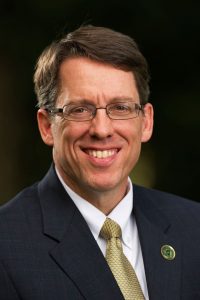
Dr. Timothy Tennent
Societal Brokenness. Tennent interacts with the ways our society has misunderstood and warped our comprehension of our bodies. The objectification of the body, the idea that what we do with our own bodies is no one else’s business and has no moral implications, the use of bodily images to incite sexual or material lust, and pornography are all examples of this warped understanding. Such an understanding leads to the destructive forces of self-hatred and shame that are so rampant in our society today.
He pinpoints the ultimate issue at stake in the current cultural debates. “This discussion is really a struggle over our understanding of the human body, not merely about the definition of marriage or who can have sex with whom … The church must affirm the twin truths that all persons are sacred and created in the image of God and yet that all are subject to the moral boundaries that God has established for human flourishing,” he testifies.
The way to combat the secularization of the church’s understanding of the body, Tennent suggests, is through effective discipleship and catechesis – the intentional and systematic teaching of the church’s doctrine and a proper theology of the body. Such catechesis sees “God alone [as] the only ground of objective moral values and truth,” and that “revealed basis for morality” is found in God’s word. “A theistic worldview provides the only firm foundation for human flourishing and moral argument,” he writes. To this end, Tennent provides a couple chapters of practical suggestions on implementing such a discipleship program.
Timothy Tennent has given us an outstanding framework for a proper theology of the body. Others can build on and add to this framework. It gives us a holistic way to address the brokenness in our culture by setting forth a positive vision of what the human body is for and what kinds of uses of the body glorify God. We are, after all, people in bodies – bodies that will be raised and glorified at the resurrection. These “glorious, image-bearing” bodies point to the spiritual and moral underpinnings of the created universe. We should understand and live accordingly.
Thomas Lambrecht is a United Methodist clergyperson and the vice president of Good News.

by Steve | Mar 18, 2021 | Magazine, Magazine Articles, March/April 2021
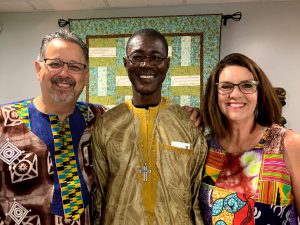
The Rev. Jorge Acevedo and his wife Cheryl flank Bishop Lawrence Beka of the Methodist Church Ghana at the 2019 missions conference at Grace Church in southwest Florida. Photo courtesy of Grace Church.
By Jenifer Jones-
Nearly 20 years ago, Jorge Acevedo had an epiphany. He’s the lead pastor at Grace Church, a multi-site United Methodist congregation in Southwest Florida. At the time, his church was one of the fastest growing United Methodist congregations in the United States. “Our local mission was on fire. I mean, we were doing great things,” he said. “But we were what I now call a Jerusalem-only church. We were only obeying one portion of Acts 1:8.”
In 2001, a lay leader suggested the church participate in what is now called Activate Training, led by TMS Global. The program aims to help churches discover and live out their unique missional calling. Participants learn what the Bible says about missions, the state of the world as it relates to God’s mission, and what shifts in thinking the church needs to make in order to deeply engage in missions.
Towards the end of the two-day workshop, Acevedo said the Holy Spirit broke him. The next morning, he told his congregation, “Your pastor needs to confess a sin to you. We’ve been red hot for our community, and we’ll continue to do that, God being our helper. But we need to get God’s heart for the world. So let’s go!”
That was on September 9, 2001. A couple of days later, Acevedo watched on TV as planes flew into the World Trade Center. “It was as if God was saying to me that this is why we need to go to the ends of the earth,” Acevedo said. “Because this world will never know peace until all people know the Prince of Peace.”
Now, 20 years later, in the midst of a global pandemic and other crises, it’s as important as ever for the Church to introduce the world to the Prince of Peace. That’s why the Rev. Reginald Belton, senior pastor of First Baptist Church of Brownsville, in Brooklyn, New York, decided to move forward with Activate Training, rather than wait until the coronavirus pandemic was over.
“I just believe we can’t turn inwardly,” Belton said, “because when we do that, we shut out everyone else. And outreach is what we’re here to do. In the Great Commission Jesus never said that everything has to be perfect for you to go forth and make disciples. You just have to go forth.”
The church is located in an area with a high concentration of public housing. Belton says the neighborhood also has high rates of crime and violence. “Inner-city ministry is a lot different than doing ministry in the south, or outside of the inner city,” Belton said. “Urban ministry is much different. In the inner city, the door-to-door stuff doesn’t work anymore. So I was looking for a way that we could be effective in our community, but also reach beyond our borders.”
First Baptist Church of Brownsville was established in 1925 and has been in its current location since 1954. Membership has fluctuated throughout the years but now sits at more than 200 people.
“We’re growing again, doing some exciting stuff,” Belton said. “But missions and evangelism have been lacking. We wanted to figure out how we could get out there and do it but do it in a very organized and systematic manner, where we were effective.” Belton and members of his congregation participated in Activate Training this past October and November. The sessions were held via video-chat over several weeks.
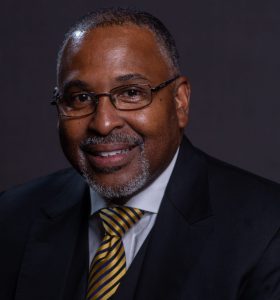
The Rev. Reginald Belton, senior pastor of First Baptist Church of Brownsville in Brooklyn, New York.
Belton says the training helped him and his team create a focused, systematic approach to outreach. “We had great things we wanted to do,” Belton said. But the challenge for the church was organizing strategic goals. “So that’s what TMS Global has done for us. They really helped us organize so that we’re not just blasting all over the place with no plan. We have a focus, and we’re moving toward that goal to do local, state, city, country, and worldwide mission and evangelism.”
Belton says his church also learned how to effectively partner with others. “We don’t have to go it alone. It’s much too big,” Belton said. “That in itself took away anxiety, knowing that we would have partners and people to join in this mission and evangelism with us. And those are people who are experts at doing it, who’ve been doing it a long time.”
Sonji Pass, TMS Global’s regional director of Church Culture, said the process works because it’s bathed in prayer. “I think it’s so easy to go into an area and immediately want to respond to its needs, and then say, ‘Oh yeah, Lord, will You bless what we’re doing?’” she observes.
Instead, those participating learn to begin with strategic prayer, to ask specific questions and listen for the Lord’s response. This kind of praying happens throughout the entire process. The Activate Training is followed by a season of coaching that lasts one-to-three years. TMS Global staff have begun to mentor Belton and his team, helping them create a focused plan for making missions the core of everything his church does.
“Our coaching is not prescribed,” Pass said. “We have a general outline, a structure, that we present, but then we allow the Lord to fill in. The rest just depends on what the church’s mobilization team responds to, and what they sense the Lord would have them do in their particular context.”
It’s been nearly two decades since TMS Global finished the coaching process with Jorge Acevedo and Grace Church in Florida. In the years since, he says his congregation has raised millions of dollars for missions, sent thousands of people on mission trips, and participated in countless hours of prayer. “I’ve watched as our people have moved into the neighborhoods of the world and seen their lives changed,” Acevedo said.
As part of the training, churches learn how to raise more money for missions through faith promise giving. Each individual prays and asks God what dollar amount he would provide for them to give. They then pledge that amount, and trust God to provide.
Rhonda Dahlin, also a regional director of Church Culture, reported that some churches raise three, four, or even ten times the amount of their previous missions budget in one year by following the faith promise plan. “We are not called to go and do something in our own effort,” Dahlin said. “We’re called to respond to what God is saying He is going to do through us. So applying that also to our giving is the principle behind faith promise.”
Acevedo says his congregation’s giving to faith promise has actually increased during the coronavirus pandemic. Although his church completed the coaching process with TMS Global close to 20 years ago, he says saying “yes” to the mission of Jesus requires constant, ongoing work and a willingness to innovate.
“For our church, every year, it’s winning more converts. I don’t mean converts to Jesus; I mean converts to God’s mission in the world,” Acevedo said. “I always pray, every year, ‘Lord, will you give us a few dozen more converts to the world?’ And every year I see people saying, ‘Oh, I’ve got to join Jesus in his mission.’”
Acevedo says he’s had to innovate throughout the coronavirus pandemic. But he’s continued to focus on missions, because the needs of his church’s mission partners have increased, not decreased.
And what about after the pandemic? What then? “Many pastors are looking around at nearly empty pew seats – or fewer people logged on to online services – and wondering what their church will look like this time next year,” said Sarah Parham, senior director of Domestic Mobilization for TMS Global. “They’re asking, ‘Who will we become?’”
“When the church emerges from this pandemic it will be different,” says Dahlin. “And we have to emerge as a missional church. We have to have a missional outlook. If we’re not missional as churches, we are going to accelerate our decline, especially in the U.S.”
“Loving our neighbors and transforming our communities has never been more vital,” says the Rev. Carolyn Moore, lead pastor of Mosaic Church in Evans, Georgia. She agrees that, unless things change, the American church may be headed into a time of decline. “These have been defining days for so many people, and when we emerge from this, many will struggle to regain faith and energy for Kingdom work. The lack of discipleship and worship for so many over such a long period is going to take its toll.”
But, she notes, there’s still hope. “There is so much potential for being a positive force and voice in our communities, and I believe most communities are starving for that kind of voice. If we emerge with a missional voice that is married to strong, intentional discipleship, we could well look back on this season as the time when the Church got serious about advancing the Kingdom of God.”
Belton with First Baptist Church of Brownsville says Christians can be expanding the Kingdom even now. “This is a great time to do it because people are looking for answers. People are desperate. So I would encourage churches to jump in now, because this is the time that we’re going to have our greatest impact!”
He says he’s looking forward to leaning into the coaching process and putting what his church learns into action. “I thank God for TMS Global. I really do,” he says. “It’s going to be exciting.”
Jorge Acevedo says he encourages more churches to utilize the resources offered by TMS Global. “You’ve got nothing to lose,” says Acevedo. “And who knows? You might have your own ends-of-the-earth epiphany as I did. Or, as I tell my people around here, Jesus will wreck your life, and you’ll love it.” Acevedo says.
Jenifer Jones is a writer who focuses on telling stories about the work God is doing in the world. She’s also a poet. Find her writing at www.jeniferjones.com.
There’s no cost for TMS Global’s Activate training and coaching. If churches find value in the resources, they are encouraged to pay it forward so that other churches can participate. For more information about resources offered by TMS Global’s Church Culture Department, visit www.tms-global.org/churches.





 By Zim Flores –
By Zim Flores –



 My upbringing on a dairy farm also did away with any squeamishness over sleeping on cow-manure floors, eating maggots and bugs like I did in India, drinking cow’s blood in parts of Africa, you name it. I realized early on that not only my acceptance of native practices, but my participation in them, would build a bridge of trust between us. I would no longer be considered an outsider, but would become like one of them. I knew this was a key to being able to effectively share the gospel.
My upbringing on a dairy farm also did away with any squeamishness over sleeping on cow-manure floors, eating maggots and bugs like I did in India, drinking cow’s blood in parts of Africa, you name it. I realized early on that not only my acceptance of native practices, but my participation in them, would build a bridge of trust between us. I would no longer be considered an outsider, but would become like one of them. I knew this was a key to being able to effectively share the gospel.
 Created Purpose of the Body. Humanity was created for a purpose – to represent God on earth. Fulfilling that purpose, we are given the roles of fruitfulness and stewardship of the earth, including our own bodies (Genesis 1:28, 2:15). We are called “to extend [God’s] dominion over the created world … to steward it according to God’s gracious rule,” Tennent writes. God’s image reflects “a special relational capacity” that is demonstrated in our ability to make covenant relationships with one another, particularly the covenant of marriage. “We understand that we have the capacity to recognize moral categories because we are endowed with the image of God and the empowering presence of the Holy Spirit,” he states.
Created Purpose of the Body. Humanity was created for a purpose – to represent God on earth. Fulfilling that purpose, we are given the roles of fruitfulness and stewardship of the earth, including our own bodies (Genesis 1:28, 2:15). We are called “to extend [God’s] dominion over the created world … to steward it according to God’s gracious rule,” Tennent writes. God’s image reflects “a special relational capacity” that is demonstrated in our ability to make covenant relationships with one another, particularly the covenant of marriage. “We understand that we have the capacity to recognize moral categories because we are endowed with the image of God and the empowering presence of the Holy Spirit,” he states.

